Apr 25, 2024
Apr 25, 2024
Director: Andrey Zvyagintsev / Russia /Russian/105 mts
Winner of the Silver Lion at the Venice Film Festival (2003), "The Return" is a true work of art and one of the outstanding films of the decade.
"The Return" makes a compelling case in favor of a poetically complex narrative over the expectations of 'The Hollywood Ending', where life eventually makes some kind of sense. The absence of a father can create a psychological 'presence' for the family, both seen and felt in the emotional interaction of the children. This complex, yet all too human condition is played out here, not as a narrative sleight of hand (The Sixth Sense) but rather as film poetry. Life's hardest truths sit like a stone in the mouth and won't be broken down easily. The characters in this film seem to be struggling with the absence of their father, but doing so with him present.
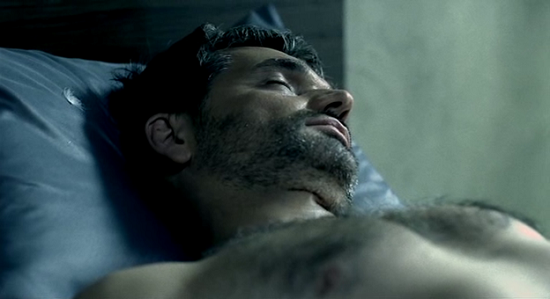
Meeting the sleeping father after his return
"The Return," a breathtakingly austere masterpiece from the land that gave us Eisenstein, Pudovkin and Tarkovsky, is one of the most beautifully acted and directed films I have seen in recent years. Astonishingly enough, this is the feature film debut for director Andrei Zvyagintsev and yet he demonstrates more of a mastery and command of the medium in this his maiden effort than most directors do in a whole body of work.
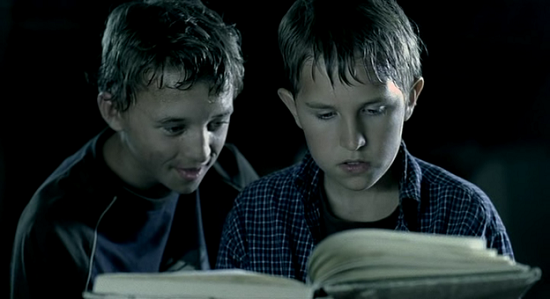
Andrei and Ivan confirming the image of their father from an old photograph
This is a film of rare beauty and authenticity about the complex bonds between a father and his two sons and the need to discover one's self. The director Zvyaginstev leaves much unexplained and the film, while a simple story on the surface, has suggestions of Greek mythology, political allegory, and religious parable. The film takes place in seven days, separated into segments. The two boys, Andrei (Vladimir Garin), who is about 13, and Ivan (Ivan Dobronravov), a year or two younger, are very different but have become attached to each other as a result of their father's absence.
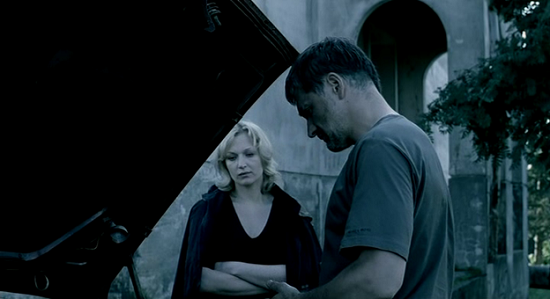
Before the Car Journey: the father with his wife
As the film opens, Ivan is being taunted by a group of friends and called "chicken" because he is afraid to climb up a huge tower and dive from a pier. When the boys return home, they are astonished to discover their father sleeping on a bed as if posing for a religious painting of the dead Christ. Their father has returned after a twelve-year absence. At dinner, the father (who is not named) is cold and uncommunicative except to tell the boys that they will go fishing the next morning and to pass out wine to everyone. To confirm their father's identity, the boys find an old photograph of their father in a Bible adjacent to a drawing of the scene of Abraham about to sacrifice his son Isaac.
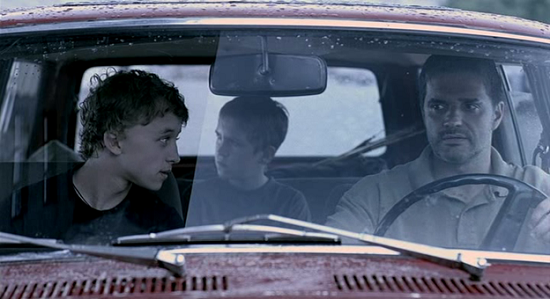
The journey with the sons
In an effort to make up for lost time, the dad decides to take his sons on a fishing trip, but, almost immediately, he begins to demonstrate disturbing tendencies towards domination and abuse. He also appears to be up to some sort of nefarious business operations to which neither we nor the boys are entirely privy. As they drive through the brooding, isolated Russian countryside on their way to a rendezvous at a remote island, the boys confront their most longed for expectations and also their most dreaded fears.
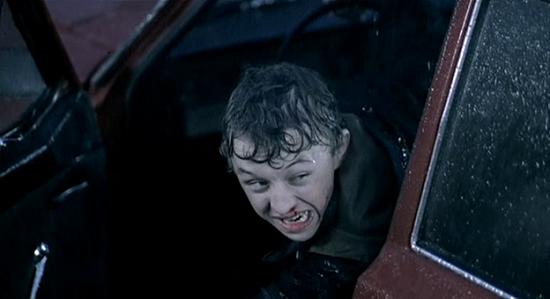
The happy Andrei when he successfully pulls the car out of the mud track
Every single moment of this film is a revelation. Zvyagintsev beautifully captures the opposite ways in which the boys react to and interact with their father. Andrei, the oldest, is so desperate for a father figure in his life that he is willing to overlook the often inexplicable, bizarre and possibly even dangerous behavior that this particular father exhibits. Ivan, on the other hand, embittered by years of absence and neglect, seethes with barely disguised rage at the man who now presumes to enter into their once happy lives and assert his authority. Of the two boys, he seems the most tuned into the kind of threat the father may pose to their welfare. Yet, towards the end of the story, the apparently latent love the boy feels for this man as his father does eventually rise to the surface. Through this intense interaction, the film emerges as a complex and profound study of what father and son relationships are really all about.
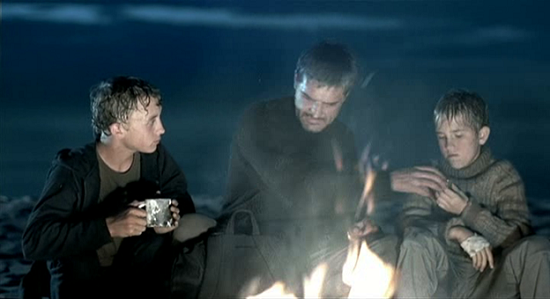
Campfire after a tiring boat trip to an island
It is virtually impossible to put into words just how brilliantly the two young actors use their facial expressions to convey a wealth of meaning and emotion. As portrayed by Vladimir Garin, Andrei looks up to his father with a mixture of boyish pride and trembling awe, longing for the kind of male affirmation he has been deprived of all these years. He is desperate to please his father by proving to him that he can perform the acts of manhood that his dad keeps putting forth for him to do. As Ivan (Ivan Dobronravov) spends most of his time glaring at the man; his mouth pursed in a tight unyielding grimace of resentment and hate. The acting of these kids is amazing. Tragically, young Garin drowned two months prior to the release of the film, leaving his indelible mark behind in a performance that will never be forgotten by anyone privileged enough to witness it. Konstantin Lavronenko is equally impressive as the boy's mysterious father, beautifully underplaying the part of a man who can appear sane and rational on the surface but who is a seething cauldron of untapped emotions beneath. In fact, it is this constant threat of violence always on the verge of eruption that keeps us off balance and on edge throughout the entire picture.
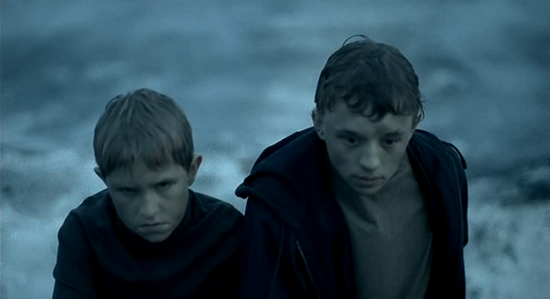
The poignant return back home
The film's writers, Vladimir Moiseyenko and Aleksandr Novotosky, deserve special recognition for not allowing the plot to overwhelm the characters. For this is, first and foremost, a great character study. The scenarists have intentionally left the background of the father vague and sketchy, the better to enhance the sense of mystery and danger he represents. We never find out what nefarious activities he is involved with since that is of virtually no importance either to the children or to us. We are too engrossed in the relationships of the characters to care. In fact, there are a few hints towards the end of the film that this seemingly cold, uncaring man, for all his myriad faults, might actually just love his sons in his own strange way. The film leaves us with no easy answers or pat resolutions at the end. And this is how it should be. In fact, the scriptwriters even throw a few of Hitchcock's prized "MacGuffins" into the mix to keep us off balance (there is a scene in which some possibly stolen money sinks to the bottom of a lake that is highly reminiscent of what happens in "Psycho").
The director's lyrical use of composition, as well as the way in which he makes nature and weather an integral part of his drama, help to draw us so deeply into this world that it takes the viewer literally hours to get fully back to his own existence again once the movie has ended. It reverberates for days afterwards. For as with any great film, "The Return" finds its way into the depths of one's soul and leaves the viewer a richer person for the experience.
A series of "Hundred Favorite Films Forever"
19-Dec-2012
More by : P. G. R. Nair